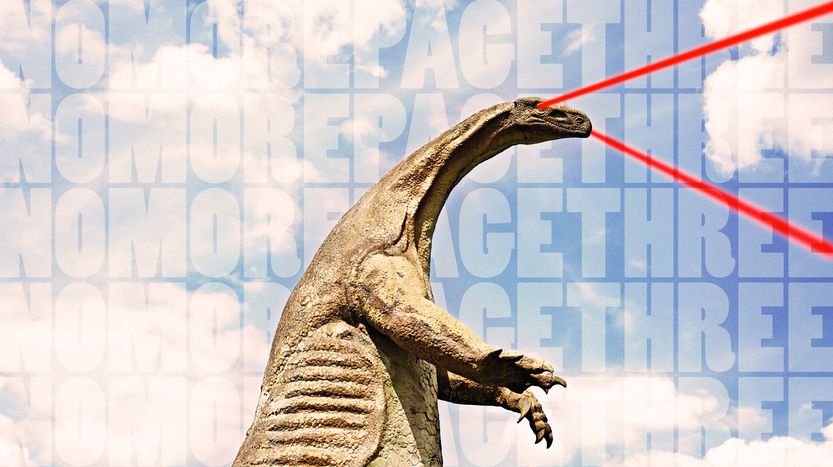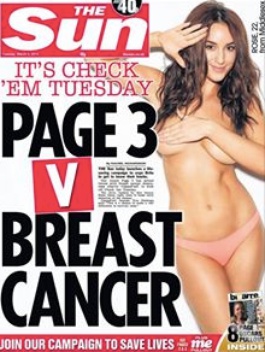
Boobs are not news: No more page Three.
Published on
The Sun is the UK’s most read newspaper. Since 1970, Page 3 has hosted a topless female model. The feature has been branded objectifying, misogynistic and damaging to men’s perceptions of women, and women’s perceptions of themselves. Finally society has said enough is enough. The ‘No More Page 3’ petition already has 184,000 signatures. Cafébabel spoke to Ceris Aston, founder of NMP3 Edinburgh
Cafébabel: Why do you think it’s important to get rid of Page 3?
Ceris Aston: There are a fair few reasons. One of the things that gets me is a lot of people think it’s really trivial. They ask, “If you’re a feminist focusing on campaigns, then why this? Aren’t there more important things to worry about?” The fact that people see it as so trivial shows how pervasive and damaging it is. In the most widely read newspaper in the UK (12.4m people read the print edition every week, Ed.), women are portrayed as objects with big boobs, whereas men can act, men can change the world, and women just have their tits out next to that- it’s a horrible message. The fact that so many people don’t think it’s important makes me want to do the campaign all the more - to highlight why these things do matter.
I’ve spoken to so many women who say, “I pretty much spent my entire teenage years feeling uncomfortable, because guys would be comparing me to the images on Page 3, feeling it was acceptable to rate how good someone’s tits were.” It’s been a really damaging force. If Page 3 is a symbol of the sexism in our society, then changing it could be a symbol that society is changing.
 Cafébabel: Do you think Page 3 is a relic of a bygone era when sexism was more widespread and ingrained?
Cafébabel: Do you think Page 3 is a relic of a bygone era when sexism was more widespread and ingrained?
Ceris: Yes- it comes from an era where it was seen as OK to be really openly sexist. These days misogynists say, “oh now they have these sexual harassment things, people used to think it was a compliment if you pinched their bottom or called them gorgeous at work.”
Cafébabel: Do you think it creates an ideal of female beauty that’s not realistic, putting pressure on women, particularly young girls? Could it be linked to the proliferation of eating disorders in society today?
Ceris: I think so. One of the arguments The Sun have used to defend Page 3 is that “it’s a celebration of female beauty”, but it isn’t- it’s the celebration of a really small section of females, I guess 18-22 year olds, who have big boobs, are mostly white and slim and have figures most women don’t have. I think it’s enormously damaging to self-esteem.
So for a lot of girls growing up, there is this expectation from society that this is what a woman should look like and this is what a woman’s role should be- to be attractive and sexually available. That’s the image given by Page 3. It’s very objectifying.
None of the reasons The Sun have come up with for retaining it are in any way valid- “a cheeky bit of fun”- it’s not fun. The Sun is a family newspaper- it’s something people grow up with. Whether or not your parents buy it, it’s still there. I don’t think the “if you don’t like it don’t buy it” argument holds water at all.
Cafébabel: Has there been any indication that The Sun’s editors and owners are listening?
Ceris: Rupert Murdoch replied to a tweet from a supporter, which was saying “Page 3 is so last century”, and he said “maybe you’re right- we are considering a halfway house with glamorous fashionistas.” Well… they’re listening to the campaign. I’m not sure that’s really what we’re envisaging as an ideal solution, but we are being listened to.
The Sun are running Check’em Tuesdays in association  with the Coppafeel Campaign to get young women to examine their own breasts for early signs of breast cancer. People are speculating that the reason the Sun are doing this is because they need to rebrand Page 3 as something potentially positive, because it’s getting a lot of negative publicity. Coppafeel is a great campaign. I think it’s sad, though, that the only way The Sun could think of to highlight the cause of breast cancer and early detection was to use a teenage semi-naked woman in a sexualised pose. It’s a celebration of the boobs that sufferers of breast cancer don’t necessarily have. It equates desirability and femininity with ‘perfect’ breasts.
with the Coppafeel Campaign to get young women to examine their own breasts for early signs of breast cancer. People are speculating that the reason the Sun are doing this is because they need to rebrand Page 3 as something potentially positive, because it’s getting a lot of negative publicity. Coppafeel is a great campaign. I think it’s sad, though, that the only way The Sun could think of to highlight the cause of breast cancer and early detection was to use a teenage semi-naked woman in a sexualised pose. It’s a celebration of the boobs that sufferers of breast cancer don’t necessarily have. It equates desirability and femininity with ‘perfect’ breasts.
Cafébabel: How’s the campaign going in terms of figures, notable successes…
Ceris: Over 100 MPs have signed, there’s support from MPs, MSPs, and Members of the Welsh assembly, quite a few celebrity figures- even Russell Brand recently supported the campaign.
No More Page 3 has sponsored Cheltenham Women’s football team, which raises awareness for both the campaign and for women’s sport, which doesn’t get enough attention.
Cafébabel: What do you think are the most insidious manifestations of sexism, Page 3 aside?
Ceris: Calling attention to someone’s gender because it’s surprising. In sport especially, you hear “amazingly it was a woman who achieved this”.
I recently saw a list of trustees for some big organisation and it parenthesised the fact that one of these people was a woman. But it’s irrelevant. So often gender is irrelevant but people bring it in if it seems surprising. If it’s still surprising that women are in positions of power, then we’ve got some way to go yet.
No More Page 3 Poem by Sabrina Mahfouz
Cafébabel: Lucy-Anne Holmes said she started the campaign by chance using change.org - she just decided to start up a petition, and then she was surprised when it really gained traction. Do you think the internet has an important role to play in empowering society to change things and take on established institutions, showing people things don’t always have to be the way they have been?
Ceris: The internet’s a funny thing because it can empower us but it can also really disempower us. It’s a democratising force, because, on Twitter, for example, it doesn’t matter who you are, it just matters if your voice gets heard, and it can.
The internet has a lot of potential. It’s a way of gathering people who care about the same issues. I don’t know how this campaign would have happened without social media.
Of course, there’s also the risk of getting distracted by lots and lots of pictures of cats!
Cafébabel: On the No More Page 3 site, it seems empowering for people to be able to tell their story and to see that other people have also experienced the same things. People aren’t isolated in their own experiences.
Ceris: Yes, the campaign empowers people who have been feeling so uncomfortable about this for so long, but didn’t even think, “I can’t change it” because changing it didn’t even come into their heads. But then someone stands up and says, “actually this has no place in a newspaper, it’s not news, it’s a young woman with her tits out to titillate men- that’s not news,” and everybody else suddenly agrees- “you’re right, it’s affected me for so long, it’s affected how I see myself, how men see me, I don’t like it.” It’s amazing when that happens.
Join No More Page 3 Edinburgh.
Attend No More Page 3 Edinburgh's event "Boobs Aren't News: media, power & page 3" on 2 April.



